Cornish Cross are one of the worst breeds I have seen in my life, if not the top worst. The only thing they do all day is sit in their poop and continually eat, only occasionally roaming around the yard even though there is plenty of space for them to do so. Not to mention that their poop is literally everywhere you step and it is in huge piles, much larger than a normal chicken's. They are destructive and turn everything to a pile of poop and mud. Cornish Cross are oriented so much to food that they attack you for it. This goes for both genders; the cockerel started attacking me first when he saw me with the feed bucket, and the pullets followed along and attacked me as well. Two of them died before butcher age, one from leg problems and the other one from a heart attack. Cornish Cross are extremely loud and they constantly make this annoying honking noise because they choke on their food since they eat so fast and so much. The only things good about this crossbreed is that they are fast choice for meat production and they can easily fight off diseases such as coccidiosis and fowl pox, but other than that, don't waste your time and your yard space. American Bresse would be much better.
Navigation
Install the app
How to install the app on iOS
Follow along with the video below to see how to install our site as a web app on your home screen.
Note: This feature may not be available in some browsers.
More options
You are using an out of date browser. It may not display this or other websites correctly.
You should upgrade or use an alternative browser.
You should upgrade or use an alternative browser.
-
 d213c165_cornish_cross-21703-475586.jpeg3.8 KB · Views: 3,038
d213c165_cornish_cross-21703-475586.jpeg3.8 KB · Views: 3,038 -
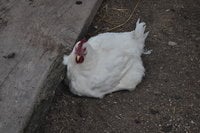 6ab252da_DSC_0088.jpeg2.9 MB · Views: 3,120
6ab252da_DSC_0088.jpeg2.9 MB · Views: 3,120 -
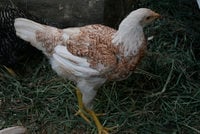 f67a56b8_QDI_Marilyn.jpeg367.8 KB · Views: 3,149
f67a56b8_QDI_Marilyn.jpeg367.8 KB · Views: 3,149 -
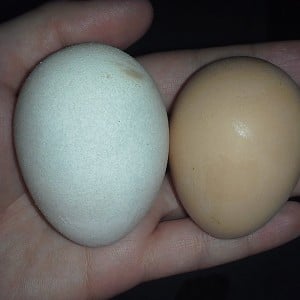 white egg.jpg196.2 KB · Views: 2,003
white egg.jpg196.2 KB · Views: 2,003 -
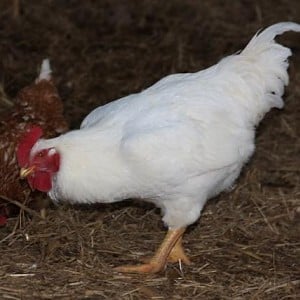 Rooster.jpg34.2 KB · Views: 2,100
Rooster.jpg34.2 KB · Views: 2,100 -
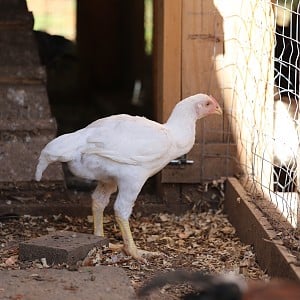 Juvenile.jpg508.4 KB · Views: 2,020
Juvenile.jpg508.4 KB · Views: 2,020 -
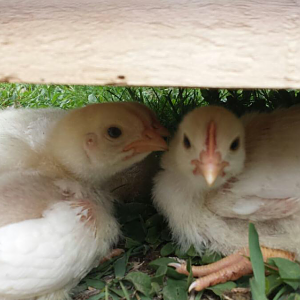 chicks.png1.3 MB · Views: 2,080
chicks.png1.3 MB · Views: 2,080
Cornish Cross
- Added by Super Admin
- Create date
- Updated
Cornish Cross (Cornish X) chickens are the standard meat chicken for the American market. ...
- SwampPrincessChick
- 1.00 star(s)
Pros: Great for meat production, resilient to many diseases such as coccidiosis and fowl pox.
Cons: Nasty, loud, eats too much, annoying, aggressive, stupid, destructive, not scared of predators.
- BantyChooks
- 5.00 star(s)
When raised correctly, CX are far from the apathetic Frankenstein-clones their repute would have you think. I raised them with my layer flock in a free-range setting with limited food, and it paid off. At times I found it difficult to tell them apart from my leghorns without looking at their feet! They were about the size of a regular grocery-store bird when I butchered them at ten or so weeks of age. Overall, I am quite pleased with them and will purchase another batch in the future.

Image caption: two eight-week-old Cornish Cross in the foreground, with a Pearl guinea fowl and a White Leghorn pullet in the background.
Image caption: two eight-week-old Cornish Cross in the foreground, with a Pearl guinea fowl and a White Leghorn pullet in the background.
- Kessel23
- 5.00 star(s)
Pros: Grow fast, very friendly, fun to watch, more hardy than you would expect, and they taste good.
Cons: Leg problems and other growth related issues have been the main problem for me with this breed.
I got 53 of these guys this year, they are very awesome birds and are way more hardy than most people claim. I was expecting to get a weak bird that has a high death rate because of what I read. Out of 53 birds I only had around 5 die, all of them were from leg or other growing issues, 2 of them had to be culled earl because of this. Other than the leg stuff they are great birds. I kept a few of these guys to cross breed with my egyptian fayoumi, golden campines, and leghorns.
- AA Maple
- 5.00 star(s)
Pros: Good natured, fast growing, and delicious.
Cons: Be ready for the "throughput".
I just ate the first of my Cornish Cross broilers. At 8 weeks he dressed out to 6 pounds 8oz not counting the heart, liver, gizzards, etc.
I bought a dozen through a local guy who does an egg business and raises a bit of meat birds. One was lost due to carelessness (people who were watching them) week one, and one died for no apparent reason week 7. I'll be eating them as they grow over the next few weeks.
These birds were everything they advertise. Fast growing, voracious eaters, and tender juicy meat.
Mine were pretty lazy, not wandering far from their food, but they did stroll around and forage a little. Definitely good natured birds, calm and pretty friendly with each other and people, even though I try to not get too friendly with them knowing that I'll have to give them all the axe eventually.
In retrospect I'll probably put my next batch in tractors. These just didn't really care to explore much and their steady flow of food---poo through them gets to be a bit abundant in a permanent coop.... unlike my laying hens that travel a lot during the day to scatter their droppings, it really piles up around these broilers.
Did I mention how delicious these are? Easy plucking and made a big meaty dinner + plenty of leftoverrs. And all things considered not that much money into them buying chicks local and 15$ a bag for starter/grower feed. I don't think I'll look any farther for a meat bird for next year and having such good results I'll likely look to get many more.
Lastly, keep an eye on their water. They drink almost as fast as they eat and compared to other birds I have around they'll really surprise you how fast they can guzzle your waterer dry.
I bought a dozen through a local guy who does an egg business and raises a bit of meat birds. One was lost due to carelessness (people who were watching them) week one, and one died for no apparent reason week 7. I'll be eating them as they grow over the next few weeks.
These birds were everything they advertise. Fast growing, voracious eaters, and tender juicy meat.
Mine were pretty lazy, not wandering far from their food, but they did stroll around and forage a little. Definitely good natured birds, calm and pretty friendly with each other and people, even though I try to not get too friendly with them knowing that I'll have to give them all the axe eventually.
In retrospect I'll probably put my next batch in tractors. These just didn't really care to explore much and their steady flow of food---poo through them gets to be a bit abundant in a permanent coop.... unlike my laying hens that travel a lot during the day to scatter their droppings, it really piles up around these broilers.
Did I mention how delicious these are? Easy plucking and made a big meaty dinner + plenty of leftoverrs. And all things considered not that much money into them buying chicks local and 15$ a bag for starter/grower feed. I don't think I'll look any farther for a meat bird for next year and having such good results I'll likely look to get many more.
Lastly, keep an eye on their water. They drink almost as fast as they eat and compared to other birds I have around they'll really surprise you how fast they can guzzle your waterer dry.
- fryburgfarmer
- 4.00 star(s)
Pros: Delicious, Calm, CURIOUS, Great Foragers, & Fast Growers
Cons: Must be Butchered at the Correct Time (can't holf off or leg problems/heart problems will occur), Eat like Crazy, Poop OFTEN
I've had Cornish Cross's as my meat birds for years now and LOVE those sweethearts! They are evil! They make you fall in love, then you have to butcher them soon after!! They wonder and forage GREAT but trust me, they can eat! Lovely birds with rapid growth. Just watch out for health problems as a result.
- snoopysflock
- 5.00 star(s)
Pros: They grow fast and taste great.
Cons: Lots of poop and burns grass
These birds are selling weight in 7 weeks. They grow really fast and are fun to watch grow but are messy and require special food for growth. overall these are great meat birds.
- cmchickens
- 5.00 star(s)
Pros: Great foragers, fast growing, docile, absolutely delicious!
Cons: Need "special" management to remain healthy
There is no better meat bird! With plenty of room to forage, restricted feed, and probiotics, these birds thrive. Yes, they grow amazingly quick. By restricting feed, encouraging movement, and giving them a large area to forage in, health problems can be kept to a minimum. I have never lost a bird to "flip," and I credit my management techniques. If you want lots of juicy meat and can give them lots of room, these are the birds for you!
- KelsiNS
- 3.00 star(s)
Pros: rapid growth, friendly, easy going
Cons: gluttonous
I have a brooder full of these guys in my bedroom right now. They are laid back chicks, very friendly and alright with being handled frequently. I was overwhelmed by how much they can consume, I always have a pan of feed for new chicks and at less than a week old I am already limiting their intake-they polished off over 4 cups of feed the first day, an amount that typically takes my day old poultry 3-5 days to finish. Needless to say, they do not get that much anymore. They also drink much more than the other breeds I have raised.
I'm planning on holding over a few pullets to see if we can get eggs/chicks from them with my huge Delaware roosters, but it remains to be seen if im going to WANT to keep these guys that long-they are tiny predators roaming the brooder!
I'm planning on holding over a few pullets to see if we can get eggs/chicks from them with my huge Delaware roosters, but it remains to be seen if im going to WANT to keep these guys that long-they are tiny predators roaming the brooder!
- Bigwig
- 4.00 star(s)
Pros: Good egg production, friendly and docile.
Cons: Leg weaknesses, eats a lot, poops a lot.
My Cornish Rock Cross hen has been very friendly towards people and other chickens and has laid more eggs than any other breed I have (Barred Rocks, Speckled Sussex, Americana, and Red Cross). She will follow us around the yard and will come when called. The downside to this breed is the vast quantity of poop produced as well as leg weaknesses (bumble-foot is a real issue with this breed).
- RikkiMarie
- 5.00 star(s)
Pros: Very friendly birds, rapid growth, adorable babies, very good meat, easy to care for
Cons: Need more probiotics from hatcheries, can be a constant upkeep because of droppings!, eat A LOT
This was my first year doing Cornish Cross chickens. I haven't had any personal problems with my chickens regarding their health. I decided to keep one as a pet even though they are very short lived (being females). They are in fact very friendly birds, they grow way too fast, adorable when they are babies, easy to care for like a regular chicken, and they have very good meat. However, when you get them from a hatchery they need more probiotics and vitamins, they can be very dirty birds when it comes to their bathroom habits, and they can be an expensive feed because they eat a lot.
If you want to keep some as hens or just regular pets, make sure you give them enough vitamins and probiotics and limit their feeding if you don't want them to grow rapidly because they eat so much.
If you want to keep some as hens or just regular pets, make sure you give them enough vitamins and probiotics and limit their feeding if you don't want them to grow rapidly because they eat so much.
- Twistedfeather
- 3.00 star(s)
Pros: Fast growing, easy to raise, Confine themselves in small spaces
Cons: Can be messy, develop more problems than normal chickens, get so big that they can't hold themselves up
Developed to produce a bigger carcass compared to the slightly skinnier chicken that was being produced the Cornish Cross is a result of mating a double breasted cornish male and a tall large boned Plymouth Rock female according to Wikipedia. They are the main commercial meat bird because conveniently they can grow in 7 weeks or 14 weeks depending on the strain. Cornish Cross do not make the best backyard birds since they do tend to tear up the property more plus the fact that they were designed only to eat, drink, and poop you'll be better off picking a Barred Rock or Silkie as a backyard chicken. Those who want to make a small profit can raise these for meat just watch the feed price as these monster birds do eat more because of a quicker metabolism. Ever since the Cornish Cross developed new clinical conditions have been discovered or re-looked into. The most common might be slipped tendon, Breast Blisters, and other more serious diseases sweep through a flock. Good management of weight would be suggested as they get can get overweight and develop undesirable fat.
- Loc20chick
- 4.00 star(s)
Pros: Friendly, easy to handle bird. Great feed/meat conversion ratiodue to fast growth. Good forager, great tasting.
Cons: Can eat alot if penned all day.
Raised four CX from day1, after learning about Fermented feed and feeding this to them, they ate less but kept growing, they didn't have the disgusting liquid poop that most people describe here. They had tender great tasting meat, better than the store bought ones.
- MamaKitty913
- 3.00 star(s)
- ozu
- 2.00 star(s)
Pros: Friendly as chicks, easy to get attached. Produce a LOT of meat.
Cons: Grow too fast, all they do is poop/eat/sleep/pant.
We had two and it was hard not to grow heaps attached to them because they had very sweet and friendly personalities as chicks. But as they grew they just became a pain. We were cleaning up after them every day and it was hard to watch them struggle to walk. When they weren't struggling to walk and panting, they were shooting out poop and stuffing their faces or sleeping. Even had a prolapse in one chick. They only ever got up to eat. If I wanted to raise chickens for meat, I would choose a different breed.
- Chicken Wanter
- 4.00 star(s)
Pros: Fast, fun to play with, strong, eats anything, handles pain well, large, flies well.
Cons: Poops a lot, likes to venture far, eats a lot, flies well.
These are good starter chickens. They're slightly aggressive, but only males to each other. They are submissive when caught or even if your hand is on their back. They like running around, so try to fence them in, though they don't go too far. They actually run really fast, and even fly as a last resort. They can fly slightly, up to about a foot, and only for a few seconds. They eat a lot, but eat most anything. They do poop a lot, so let them roam on grass so it comes to a use. If you try wrapping a long string around their foot to catch them, they will run, curl up the trapped foot to free it, and run off. All in all, they are good starters, and I recommend this breed.
- RJSchaefer
- 3.00 star(s)
Pros: Meaty, friendly, great foragers, low-brooding time
Cons: Overzealous at feeding time, slowed growth when free-ranged
We've done two runs of free-ranged Cornish X this year and neither has lived up to the hype. They meat up faster than layers, but don't provide the excellent return on investment as promised. I'm sure they'd grow out faster in confinement, but they are wonderful foragers and have absolutely rid our farm of Japanese beetles, cicadas, locusts and other nuisance insects. They are intelligent, friendly birds who easily acclimated to life in our laying flock and readily return to roost at night. My main complaint is they are extremely zealous eaters and come from all corners of the yard to mob me for feed if I so much as walk near the coop.
- Purchase Price
- 1.65
- Purchase Date
- 2013-07-09
- erinchelsea
- 4.00 star(s)
Pros: Fast growth, easy to fence, good feed/growth ratio, lots of tender white meat, easy to pluck, sweet friendly birds
Cons: Need to be managed properly to avoid problems such as leg problems or early death
We have raised several batches of Cornish cross from different hatcheries and have had great success. I love that they are ready to process in 6-8 weeks and then they are done, as opposed to other meat breeds or dual purpose breeds that take much longer to finish. They have so much meat on them and it is tender, delicious, mostly white meat. They do much better raised on pasture with room to roam or in tractors moved frequently to give them plenty of greens to eat and to keep them clean. They have a tendency to over eat if allowed so we restrict feed to only 12 hours a day, and take the food away for the other 12 hours a day. They also require a lot of fresh water to drink but if managed properly are very easy to raise.
- CandySilkieGirl
- 2.00 star(s)
Pros: Great meat
Cons: Dumb, Do not stop eating, so messy
I don't think you will ever get an egg from these chickens. The only hen we tried to keep died young of heart failure. They can barely walk and have a lack of feathers! But I can say they taste good!
- cynthiagee
- 3.00 star(s)
Pros: Fast growth, big meaty birds, pullets mature into reliable egg layers, GREAT cold tolerance
Cons: FLIP in cockerels, hens are short-lived due to heart problems, heat intolerant, and huge amounts of POOP!!!
We've been raising these birds for years. Aside from a tendency to heat intolerance, the biggest downside to this breed is the HUGE amount of poop they produce - think turds the size of golf balls, from every bird, all day long! Other than that, they are relatively trouble-free birds, as long as you don't overfeed them.
A little known side benefit of this breed are their eggs - I usually order all roosters and the few that turn out to be pullets get added to our laying flock. The pullets lay enormous eggs with huge yolks on an almost daily basis. They begin laying at about 20 weeks of age, provided they are hatched early enough in the spring to allow them to mature by late summer (pullets from late summer or autumn hatchings often never begin laying at all); unfortunately, most Cornish cross hens only live to about 18 months of age, due to a tendency toward heart problems.
A little known side benefit of this breed are their eggs - I usually order all roosters and the few that turn out to be pullets get added to our laying flock. The pullets lay enormous eggs with huge yolks on an almost daily basis. They begin laying at about 20 weeks of age, provided they are hatched early enough in the spring to allow them to mature by late summer (pullets from late summer or autumn hatchings often never begin laying at all); unfortunately, most Cornish cross hens only live to about 18 months of age, due to a tendency toward heart problems.
- RoostersCrow HensDeliver!
- 5.00 star(s)
Pros: Friendly, LOTS of meat, very tender, fast growth
Cons: Not good in heat.
.
- Purchase Price
- 2.99
- Purchase Date
- 2012-05-07
